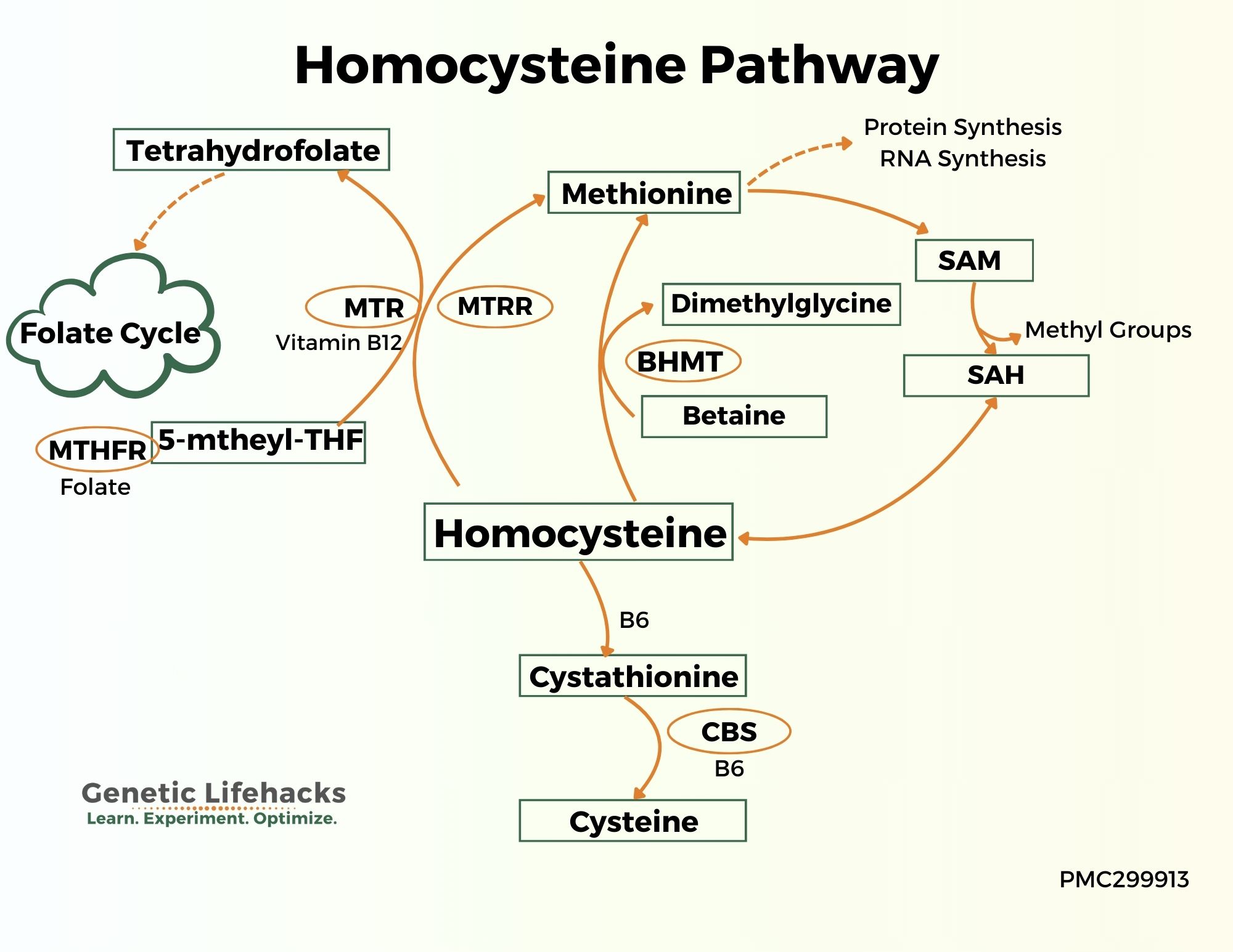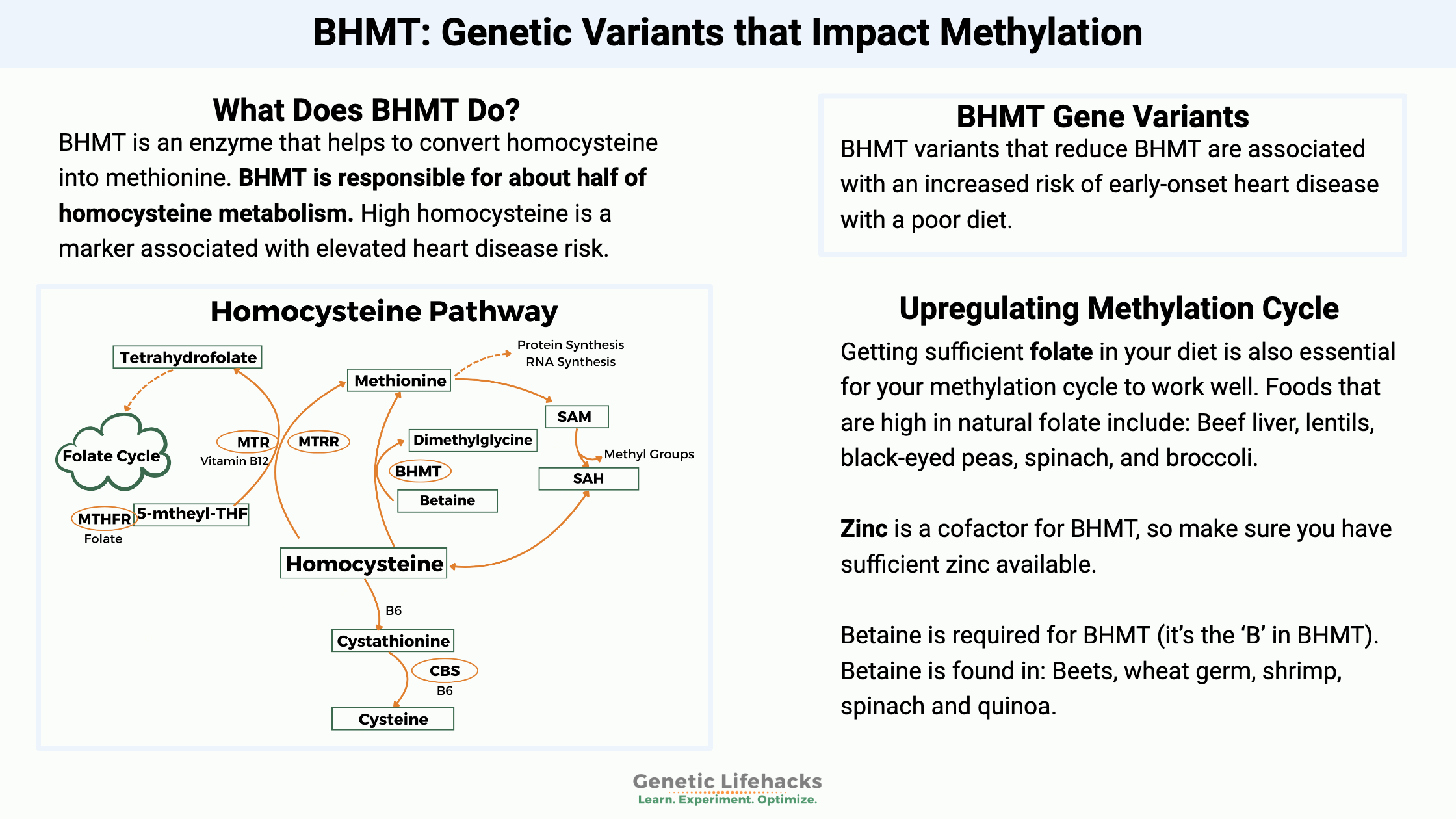Key takeaways:
~ The BHMT enzyme helps convert homocysteine into methionine in the liver, which balances out homocysteine levels and supports methyl group production.
~ BHMT interacts with betaine, which is a form of choline that is also known as trimethylglycine (TMG).
~ Variants in the BHMT gene can reduce the enzyme function, leading to higher homocysteine levels.
What does the BHMT enzyme do?
BHMT (betaine homocysteine S-methyltransferase) is an enzyme that helps to convert homocysteine into methionine.
- Homocysteine production happens in the methylation cycle and is part of how the body produces methyl groups.
Related article: Homocysteine Genetics and Solutions - Methionine is an amino acid used by the body in a million ways. It is abundant in food sources, and the body can also make it in a couple of ways, including the reaction involving BHMT.
- Betaine is also known as trimethylglycine (TMG).
Here is the reaction catalyzed by BHMT:
Trimethylglycine (methyl donor) + homocysteine (hydrogen donor) →
dimethylglycine (hydrogen receiver) + methionine (methyl receiver)
To sum up:
In the liver, the BHMT enzyme methylates homocysteine in order to produce the needed methionine. This not only helps to keep homocysteine at an appropriate level but also produces a vital amino acid (methionine).[ref]
Understanding the role of BHMT in the methylation cycle
As I mentioned above, the BHMT enzyme involves one way that the body converts homocysteine back to methionine. Another way that cells do this is by using the enzyme methionine synthase.
Within the methylation cycle, MTHFR gene variants limit methyl groups produced in the folate cycle. This is linked to higher homocysteine levels in some people due to not enough methionine synthase being available to convert homocysteine back to methionine.
The BHMT enzyme can step into that gap to provide methyl groups from choline. However, this backup route doesn’t work well in people with genetic variants that decrease enzyme function.

What happens when there are problems in the methylation cycle?
Neural tube defects are a type of birth defect that can occur when there are not enough methyl groups available during pregnancy. This is why folic acid is added to prenatal vitamins and some processed foods in many countries.
Consuming enough folate-rich foods matters a lot. Cancer rates, such as for breast cancer, increase with low folate – either through genetic variants impacting the methylation cycle or through poor diet. Many of the genetic variants only have links to an increase in the risk of cancer for people who don’t eat enough folate and/or choline.[ref][ref]
While the body has several ways of metabolizing homocysteine, BHMT is important here. In the liver, BHMT is responsible for about half of homocysteine metabolism.[ref]
High homocysteine is a marker associated with elevated heart disease risk. A number of genetic variants in the methylation cycle genes have links to higher homocysteine levels as well as heart disease.[ref] The increase in risk can be reduced through the right dietary intake of folate and other B vitamins.[ref]
BHMT Genotype Report:
Lifehacks for BHMT:
Dietary changes:
Increasing betaine in your diet:
Betaine is required for BHMT (it’s the ‘B’ in BHMT). Betaine is found in:[ref][ref]
- beets
- wheat germ
- shrimp
- spinach
- quinoa
- oat bran
- brown rice
- barley
Betaine is also available as a supplement. It may also be called TMG or trimethylglycine.
Increase choline which can be converted to betaine:
Related Articles and Topics:

